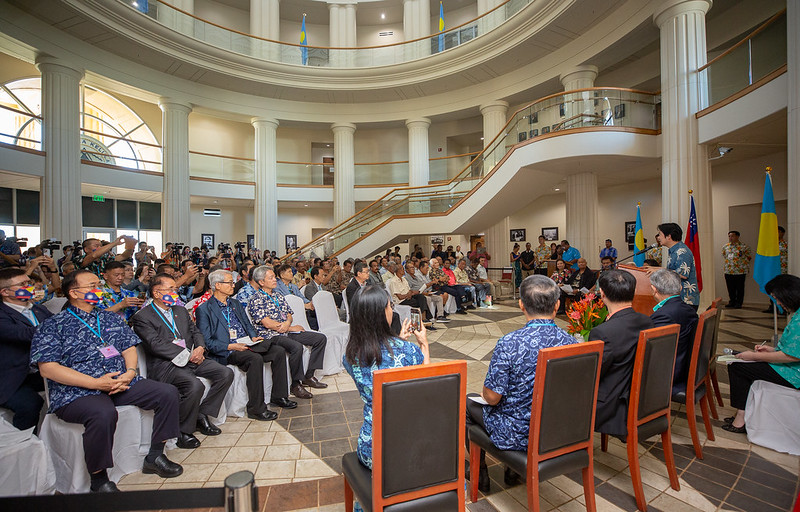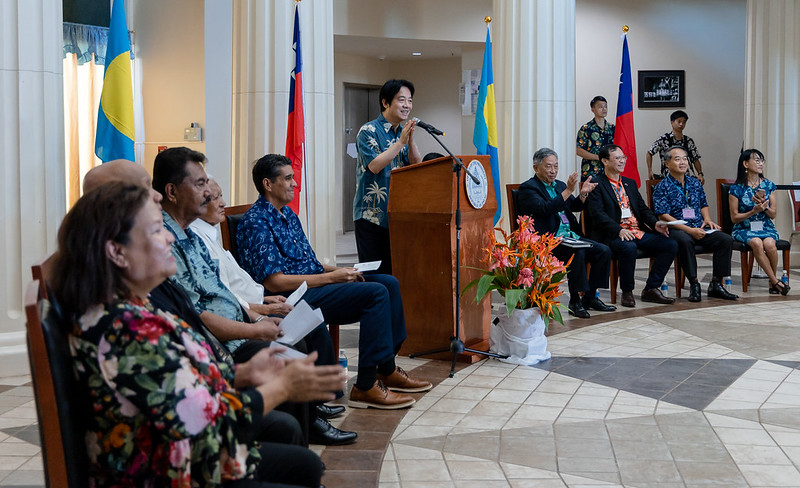News & activities
 News releases
News releases
On the afternoon of November 1 (Taipei time), Vice President Lai Ching-te attended a welcome ceremony at the Palau National Congress. In remarks, the vice president thanked the Republic of Palau's Senate and House of Delegates for their staunch support for Taiwan's international participation, which demonstrates the depth of their friendship toward Taiwan. He also expressed hope that this visit will further enhance our bilateral friendship and strengthen people-to-people ties, while helping us continue joint efforts to defend democracy, freedom, and human rights and make substantive contributions to the international community.
Vice President Lai said he was pleased to accept the invitation of President Surangel S. Whipps Jr. and lead a delegation to Palau, a country world-renowned for its natural beauty, on behalf of President Tsai Ing-wen. He said that it was a great honor to call on the members of the Senate and House of Delegates, whose enthusiastic welcome felt like coming home to one's family.
Noting that Taiwan and Palau established diplomatic relations 23 years ago in 1999, the vice president stated that over the years our diplomatic relationship has grown stronger and people-to-people ties closer, thanks to the efforts of President Whipps, his predecessors, and their governments, who have been powerfully supported by the Senate and House of Delegates, institutes that represent the voice of the Palauan people. On behalf of President Tsai, Vice President Lai conveyed the gratitude of the people of Taiwan to Palau. He also thanked the members of Palau's Senate and House of Delegates for the many resolutions they have passed supporting Taiwan's international participation, for passing a resolution to join the Formosa Club, and for publicly supporting Taiwan's meaningful participation in the World Health Assembly, International Civil Aviation Organization, International Criminal Police Organization, and other international bodies. This, he said, is a demonstration of the strength and warmth of Palau's friendship to Taiwan.
Vice President Lai noted that Taiwan and Palau are both maritime nations and that the indigenous peoples of Taiwan and the people of Palau share Austronesian roots. He added that Taiwan and Palau are both progressive countries with a shared commitment to freedom and human rights. He also expressed hope that our two countries can engage in even closer cooperation and exchanges in the future so that we can achieve the goals set by Palau's Senate President Hokkons Baules and House Speaker Sabino Anastacio: enhancing bilateral diplomatic relations; solidifying people-to-people friendships; continuing to defend democracy, freedom, and human rights on the international stage; refusing to compromise with authoritarian forces; and making concrete and positive contributions to the international community
Vice President Lai said that President Tsai and the people of Taiwan deeply cherish our country's friendship with the Republic of Palau, and welcomed the visit of President Whipps and the members of the Palau National Congress to Taiwan, adding that we place great importance on Palau's needs. He stated that this is why, just three weeks after President Whipps visited Taiwan, President Tsai instructed him to lead a delegation to pay a return visit to Palau. The vice president pointed out that this delegation includes old friends of Palau, such as Shin Kong Wu Ho-Su Memorial Hospital Chairman Eugene Wu (吳東進), President Hou Sheng-Mao (侯勝茂), and the members of the hospital medical team, as well as President Lin Ching-po (林清波) of the Hotel Royal Group, who even at the age of 90 has opted to travel with the delegation and take part in bilateral cooperation aimed at promoting tourism. Vice President Lai added that the delegation also includes the heads of 22 tourism industry associations operating nationally and in various counties and municipalities throughout Taiwan, as well as representatives from a number of leading travel agencies.
As President Whipps hopes Taiwanese fisheries and aquaculture firms can invest in Palau, Vice President Lai stated that he invited some of Taiwan's most notable experts and representatives from important firms in this sector to join the delegation, and said that they were currently exploring locations for investment. The vice president added that since baseball is an important pastime in both Palau and Taiwan, the delegation also includes Chairman Huang Ssu-chieh (黃思傑) of the Taiwan International Baseball Interchange Development Association, and well-known Taiwanese baseball stars Chen Yung-chi (陳鏞基) and Hu Chin-lung (胡金龍).
Vice President Lai stated that President Tsai entrusted three objectives to the delegation: to enhance connections with the Republic of Palau; to promote the tourism industry in both Taiwan and Palau; and to enhance cooperation between our two countries. He said that the members of the delegation would give their all, and hope to cooperate with the president and vice president of Palau as well as the members of the Palau National Congress, to achieve these three goals.
Vice President Lai said that while these three objectives are very important, the delegation members should also take the opportunity to enjoy the beauty of Palau, which is known as "God's aquarium." In closing, the vice president prayed for both Palau and Taiwan, for our diplomatic ties to grow stronger, and for even closer friendship between our peoples.
Following the vice president's remarks, Palauan Senate President Baules and House Speaker Anastacio introduced Vice President Lai to each of the National Congress members who were present.
Also in attendance at the event were President Surangel S. Whipps Jr. of Palau, Deputy Minister of Foreign Affairs Tien Chung-kwang (田中光), Deputy Minister of Health and Welfare Shih Chung-liang (石崇良), and Ambassador to Palau Jessica C. Lee (黎倩儀).











